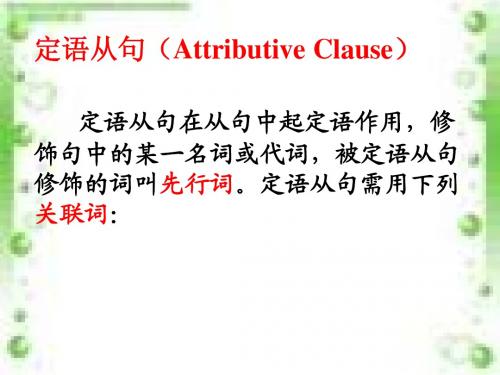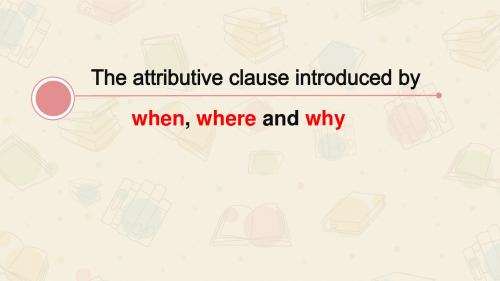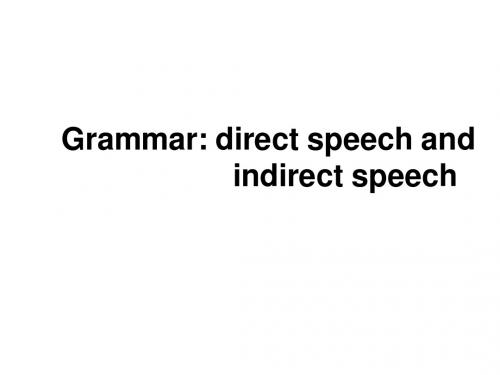M1U2 Grammar
- 格式:ppt
- 大小:2.86 MB
- 文档页数:44



用心爱心专心Module 2 No DrugsGrammar Teaching Aims: Knowledge and Skill Enable the Ss to master the important words, understand the passage and get to know the dangers of smoking and taking drugs. To get Ss to master the reading skills of scanning and skimming .To get Ss to know the gramma cal rule ————the infini ve of purpose and the adverbial of result the infini ve of purpose and the adverbial of result .Teaching Contents :Grammar 1 The infini ve of purpose +Grammar 2 Adverbial clause of result Teaching Procedures :Step 1 Presenta on. Match the uses of the word to with the sentences. A. To indicates arrangement. B. To indicates purpose. C. To follows certain verbs. I stole something every day to pay for the drugs. Teacher Wang is to meet us this a ernoon. He told me to take them to a shop in a nearby street. I con nued to buy cannabis from the same man for about six months. Suggested answers: B A C C Step 2 Explana ons: How many of them break the law in order to pay for their drugs? We can also say: How many of them break the law to pay for their drugs? How many of them break the law so as to pay for their drugs? Adam went to the man so as to buy cannabis. We can also say: Adam went to the man to buy cannabis. Adam went to the man in order to buy cannabis. Summary : (1)in order to /in order not to 可放于句首或句中。



Module 2 No DrugsGrammarTeaching Aims:Knowledge and SkillEnable the Ss to master the important words, understand the passage and get to know the dangers of smoking and taking drugs.To get Ss to master the reading skills of scanning and skimming.To get Ss to know the grammatical rule——the infinitive of purpose and the adverbial of result.Teaching Contents : Grammar 1 The infinitive of purpose+Grammar 2 Adverbial clause of resultTeaching Procedures :Step 1 Presentation.Match the uses of the word to with the sentences.A. To indicates arrangement.B. To indicates purpose.C. To follows certain verbs.I stole something every day to pay for the drugs.Teacher Wang is to meet us this afternoon.He told me to take them to a shop in a nearby street.I continued to buy cannabis from the same man for about six months. Suggested answers: B A C CStep 2 Explanations:How many of them break the law in order to pay for their drugs?We can also say:How many of them break the law to pay for their drugs?How many of them break the law so as to pay for their drugs?Adam went to the man so as to buy cannabis.We can also say:Adam went to the man to buy cannabis.Adam went to the man in order to buy cannabis.Summary : (1)in order to/in order not to可放于句首或句中。
M1U2 Grammar and usage (Ⅱ)编制:付怀红时间:2012-9-22班级:姓名:组别:自评:①真棒( )②不错( ) ③努力( ) Learning aims:1.Learn about the attributive clauses introduced by a preposition+ which and a preposition+whom .2. Learn how to use attributive clauses introduced by when, where and why.(一)定语从句一般由关系代词和关系副词引导关系代词和关系副词必须位于从句之,主句先行词之,起着先行词和从句的作用,同时在从句中又充当句子作用。
e.g. She is the girl who sings best of all.(关系代词who在从句中作)The comrade with whom I came knows French.(whom在从句中作介词with的)1、关系代词:who, whom, whose, which, that, as1)当先行词为人时用who 作语,whom作语;2)当先行词为物或整个句子时用which ,可作语或语;3)先行词为人、物时用that ,可作语或语;4)whose用作语,可指或;2、关系副词:when, where, why关系副词引导的定语从句1. When指______,在定语从句中做_______(1) I still remember the day when I first came to the school.2. Where指_____,在定语从句中做_______(1) Shanghai is the city where I was born.3. Why指_____,在定语从句中做_________(1) Please tell me the reason why you missed the plane.注意:关系副词引导的从句可以由“介词+关系代词”引导的从句替换(1) The reason why/ which he refused the invitation is not clear,(2) From the year when/ which he was going to school he began to knowwhat he wanted when he grew up.(3) Great changes have taken place in the city where/ which. I was born.(二)限制性定语从句与非限制性定语从句1、限制性定语从句:从句与主句关系密切,去掉从句,主句意义不完整,甚至不合逻辑。
七年级下册英语M1U2的知识点学习笔记I. TopicUnit 2: It’s a small world.II. Grammar1. To be verb- Am, is, are2. Demonstrative Pronouns- This, that, these, those- Use to indicate proximity and distance3. Interrogative Pronouns- What, where, who, whom, whose, which- Use to ask questions4. Present Continuous Tense- Subject + auxiliary verb (be) + main verb (present participle) - Use to talk about actions happening now or in the near futureIII. Vocabulary1. Nationalities- American, Chinese, Mexican, Italian, etc.2. Countries and cities- Beijing, New York, Paris, London, etc.3. Geography terms- River, ocean, island, mountain, etc.4. Transportation- Car, bus, train, airplane, bike, etc.IV. Expressions for communication1. Greetings- Hi, Hello, Good morning, Good afternoon, Good evening, etc.2. Introductions- What's your name?, My name is ..., Nice to meet you, Where are you from?, etc.3. Expressing likes and dislikes- I like ..., I don't like ..., I love ..., I hate ..., etc.4. Asking for directions- Excuse me, can you tell me how to get to ..., Is it far from here?, etc.V. Cultural Notes1. Cultural differences and similarities between different countries and regions.2. The importance of understanding and appreciating different cultures.3. The role of globalization in bringing people and cultures closer together.VI. Activities1. Listening and speaking exercises to practice grammar and vocabulary.2. Reading passages and answering questions to improve comprehension skills.3. Writing short paragraphs describing different countries and cities.4. Cultural research projects to explore different cultures and traditions.VII. Assessment1. Quizzes and tests to assess grammar and vocabulary knowledge.2. Speaking activities to assess communication and pronunciation skills.3. Writing assignments to assess sentence structure and comprehension.4. Cultural research projects to assess research and critical thinking skills.In conclusion, the second unit of the seventh-grade English textbook covers a wide range of knowledge points related to grammar, vocabulary, communication, culture, and assessment. By studying these topics, students will have a better understanding of the world around them and be better prepared to communicate with people from different cultures and backgrounds.。
2019-2020年高中英语《m1 u2 grammar》学案外研版必修2Ⅰ,Learning aims:1,learn about the attributive clause introduced by a preposition and which , and a preposition and whom2, use attributive clauses introduced by the relative adverbs when, where and why. Ⅱ,Learning p roceduresStep1, Preview and revision1. The girl __________is standing next to our teacher is her daughter.2. The girl _________________our teacher is talking with is her daughter.3. The girl________ mother is from Britain can speak English very well.Step2, attributive clause一,This is the boy.I played tennis _____the boy yesterday.This is the boy whom /that/ / /who I played tennis with.This is the boy with whom /that/ / /who I played tennis.We have often talked _____the famous singer.We ‘ll go to hear the famous singer whom /who /that / / we haveoften talked about.We ‘ll go to hear the famous singer about whom /who /that / / weThis school is very famous.He once studied ____ this school.This school which /that/ / he once studied is very famous in.This school which /that/ / he once studied in is very famous.You asked ____the magazine.Tomorrow I’ll bring here the magazine which / that / / you asked for.Tomorrow I’ll bring here the magazine for which / that / / you asked.preposition+ which(指物)preposition+ whom (指人)How to choose the right prepositions?Practice1. Do you like the book she spent $10?2. Do you like the book she paid $10?3. Do you like the book she learned a lot?4. Do you like the book she often talks?Conclusion: _________________________________________Test yourself1. Do you know the girl ___________our head teacher is talking?2. I can’t find my dictionary ___________I paid over $100.3. This is the good car____ ______I spent all my money.4. The teacher_____ ________you have been waiting is ing ina minute.二,The moment _____which I made the decision is exciting.______ the moment(在此刻)B)The month _____which I left for vocation is July.______ the month.Conclusion: __________________________________Test yourself1. This is the knife _________ I usually cut my pencil.2. Is this the house _______which your father was born?三,1.The house ___there is a big tree was built more than 1000 years ago.A. whichB. in front of whichC. thatD. in the front of which2.The house I grew up ____has been taken down and replaced by anoffice building.(xx江西,26)A.in itB. inC. in thatD. in whichThe house ____ I grew up has been taken down and replaced by an office building. Conclusion: ___________________________________Air, ________ which man can’t live, is really important.The pen _____which he is writing now was bought yesterday.Test yourself1) The German boss_____________ the actress works is a kind person.2) The host ______________ the guest speaker works likes singing.3) The pen friend _______________ the poet writes is good at literature.四,下面两句中的介词能提前吗?Is this the watch that you are looking for?The old man whom I am looking after is better.Conclusion: _________________________________固定搭配的动词短语中的介词一般不能提前.常见的这类动词短语有:look for/after/forward to, care for(照顾,喜欢), hear of/about/from, take care of等.e.g.This is the right place I’m looking for.The girl whom he is looking after is his sister.五,1.名词+介词+关系代词A) This is the teacher whose daughter is a famous doctor.=This is the teacher_______________is a famous doctor.B)Recently I bought an ancient Chinese vase(花瓶), _______ was very reasonable(合理的).A. which priceB. the price of whichC. its priceD. the price of whose2.数词+介词+关系代词( 含基数词,序数词,分数和百分数)A) We have three foreign teachers, ___________are from Canada. (其中的两个)B)The factory produces half a million pairs of shoes every year, 80% _____ are sold abroad.A. of whichB. which ofC. of themD. of that3. 代词+介词+关系代词(代词有all, both, none, neither, either, some, any等)A) The old woman has two sons, __________ are teachers.(两个都是)B) Last week, two persons came to see the house, ___________wanted to buy it.A. both of theyB. neither of whomC. both of themD. all of whom4. 形容词最高级+介词+关系代词China has thousands of islands, _______________ is Taiwan Island.(其中最大的)There are two buildings, ________ stands nearly a hundred feet high.A. the largerB. the larger of themC. the larger one thatD. the larger of which5.介词+关系代词+名词He spent four years in college, _____________ he studied medicine.(在那段时间内)In the office, I never seem to have time until after 5:30 p.m., _______ time many people have gone home.A. whoseB. thatC. on whichD. by whichCorrect the sentences1. After living in Paris for fifty years he returned to the small town with which he grew up as a child.2.The old man has two sons, both of them are soldiers.3.New York is famous for its sky-scrapers(摩天大楼),the higher of them has more than 100 storeys.4. Luckily, we’d brought a road map. Without which we would have lost our way.StepⅢ, conclusion1.The newly-built cafe , the walls of ___are painted light green, is really a peaceful place for us, especially after hard work.(xx江苏,32)A. thatB. itC. whatD. which2. The settlement is home to nearly 1,000 people, many of ___ left their village homes for a better life in the city. (xx浙江,3)A. whomB. whichC. themD. those3. She brought with her three friends, none of ___ I had ever met before. (xx 宁夏,28)A. themB. whoC. whomD. these4.The man pulled out a gold watch, ______ were made of small diamonds. (xx陕西,13)A. the hands of whomB. whom the hands ofC. which the hands ofD. the hands of whichstepⅣ, homeworkTalk about the picture on P10, using attributive clauses (free talk)。